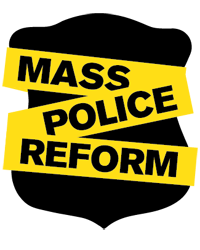Activists Petition For Federal Investigation Of Boston Police, FRONTLINE Reports
Residents and community activists in Boston have united to file a petition to the Justice Department on Monday, hoping to persuade the federal government to launch an investigation into the Boston Police Department.
The petition, which has been signed by more than 250 residents, including some representatives of local civil-rights groups, alleges that Boston police officers have a pattern of using excessive force and a discriminatory policy of stopping and searching mainly young black and Latino men.
The activists’ aim is to bring attention to what they say is a longstanding problem in Boston. Their move comes against the backdrop of nationwide protests that arose after the August 2014 death of Michael Brown in Ferguson, Mo., and have reignited following the recent shooting deaths of Eric Harris in Tulsa, Okla., Walter Scott in North Charleston, S.C., and Freddie Gray, who died from severe spinal damage sustained in police custody in Baltimore two weeks ago. (Six officers have since been charged in Gray’s death.)
In the wake of Ferguson, FRONTLINE (PBS) has published a series of digital reports exploring police reform in America—including a look at how the Justice Department tries to reform police departments like Ferguson, a story on whether the Justice Department has found a new town that preys on its poor, and an in-depth look at new Attorney General Loretta Lynch’s record on policing the police. To read more, visit pbs.org/frontline.
“We’re at this moment where, if we can’t get change right now, it’s really on us,” said Jamarhl Crawford, the community activist who wrote the letter, at a recent gathering to discuss policing in Boston. “Everybody is looking at how to reform police departments across the country. And as organizers we have to take advantage of this.”
The Boston petition will join one of hundreds of complaints filed each year across the country, from advocacy groups, community members and even sometimes city officials, asking for federal intervention. Representatives from the NAACP, Youth Against Mass Incarceration, the Immigrant Solidarity Network and the Lawyers’ Committee for Civil Rights signed the petition, as well as some family members whose relatives had been killed by Boston police officers.
With limited resources, the civil rights office must make a calculated decision about when and where to intervene. In the past 20 years, the DOJ has opened investigations into 61 law enforcement agencies — only a fraction of the nearly 18,000 nationwide. It has secured agreements mandating comprehensive reforms in about half of those.
Roughly one-third of the DOJ investigations were opened after appeals from civil-rights groups such as the American Civil Liberties Union, according to a FRONTLINE analysis. Others were spurred by civil suits filed against the department alleging misconduct or investigations by local newspapers. Only a few investigations have been sparked by a single incident, such as the August shooting death of Michael Brown.
In addition to launching investigations, the DOJ began working collaboratively with departments in 2011. Officials had been working with the Baltimore Police Department for months before Freddie Gray was killed.
How the Justice Department polices the police depends a lot on a particular administration’s priorities. Loretta Lynch, the newly confirmed attorney general, has had experience working to persuade police departments to reform as a U.S. attorney. Before her confirmation, Lynch said she would work to rebuild trust between law enforcement and the communities they serve. Now in office, one of her first acts this summer will be to meet with police departments across the country, her aides told The New York Times.
That’s concerned some civil-rights groups, who want Lynch to take a more aggressive approach to investigating police departments like her predecessor Eric Holder. “It certainly raises my clients’ fears as to what life under Lynch will be like,” said Foster Maer, a senior litigation counsel at LatinoJustice, a nonprofit group in New York that filed a complaint against the Suffolk County police department.
“Other Than Fair and Thorough”
Complaints have piled up about the Boston Police Department for years.
The activists’ letter cites several incidents of brutality in which no officers were disciplined, including a 2010 case in which officers punched and kneed a prone 16-year-old who had escaped from juvenile detention and was apprehended on a local college campus. Video of the incident was posted on YouTube and sparked a rally protesting the police.
It also noted a 2014 ACLU report that raised concerns about the department’s policy on stops and searches, drawing on data compiled by a researcher hired by the Boston Police Department. It found that 63 percent of Boston police stops, searches, interrogations and other encounters were with black residents, even though blacks make up less than a quarter of the city’s population. The reason police listed for 75 percent of those stops: “Investigate person” — which is not a constitutional reason for a stop.
When residents file complaints, Boston police don’t always investigate thoroughly,according to a community oversight panel appointed to evaluate Internal Affairs cases. Its most recent annual report found that about 41 percent of the Internal Affairs investigations last year were considered “other than fair and thorough.” But it also found that more than half – 55 percent – were evaluated fairly.
Lt. Michael McCarthy, a spokesman for the department, said he had read the letter, but declined to comment further. “I think people are entitled to send letters to whoever they want to send letters to,” he said. “That’s their choice.” He added that he believed the incidents detailed in the letter had all been “run through the system.”
Howard Friedman, a Boston civil-rights attorney, said that despite the concerns raised in the letter, he wasn’t sure the Boston police merit a Justice Department probe.
“There’s so many places that are so bad — I’m not sure Boston has reached that stage yet,” he said. “Would it help here? Sure. But it seems in Boston, they don’t go quite as far as other places. They seem to know there’s a line.”
On his website, Commissioner William Evans, who was appointed to lead the department last year, expressed his commitment to community policing. “Nothing is more effective to prevent crime and victimization than police officers forging authentic relationships with the residents, youth, non-profits and local business owners in their districts,” he said.
But a recent meeting of roughly 100 residents in one of Boston’s predominantly black neighborhoods showed just how wide a chasm still exists in the city between the police and the people they patrol. In Roxbury, sirens regularly punctuate the ordinary city bustle. That afternoon, an unmarked car full of white men with backwards ball caps suddenly pulled a U-turn in the middle of a main street, flicked on sirens and sped off.
At the meeting, people rose one by one to protest what they felt was an attitude of dismissiveness and even contempt from police officers. One woman was moved to tears speaking about her son, who had been killed by police. A man said he had been mistreated several times by police officers. Others complained about kids being frisked walking home from school or standing at a bus stop.
For many, signing on to the letter was a way of taking some kind of action against a situation they feel powerless to change.
“We’ve been dealing with this issue for decades,” said Crawford, the community activist who wrote the letter. “A letter to the DOJ is obviously not going to solve all the problems of policing. But it’s a step in the right direction towards accountability.”

